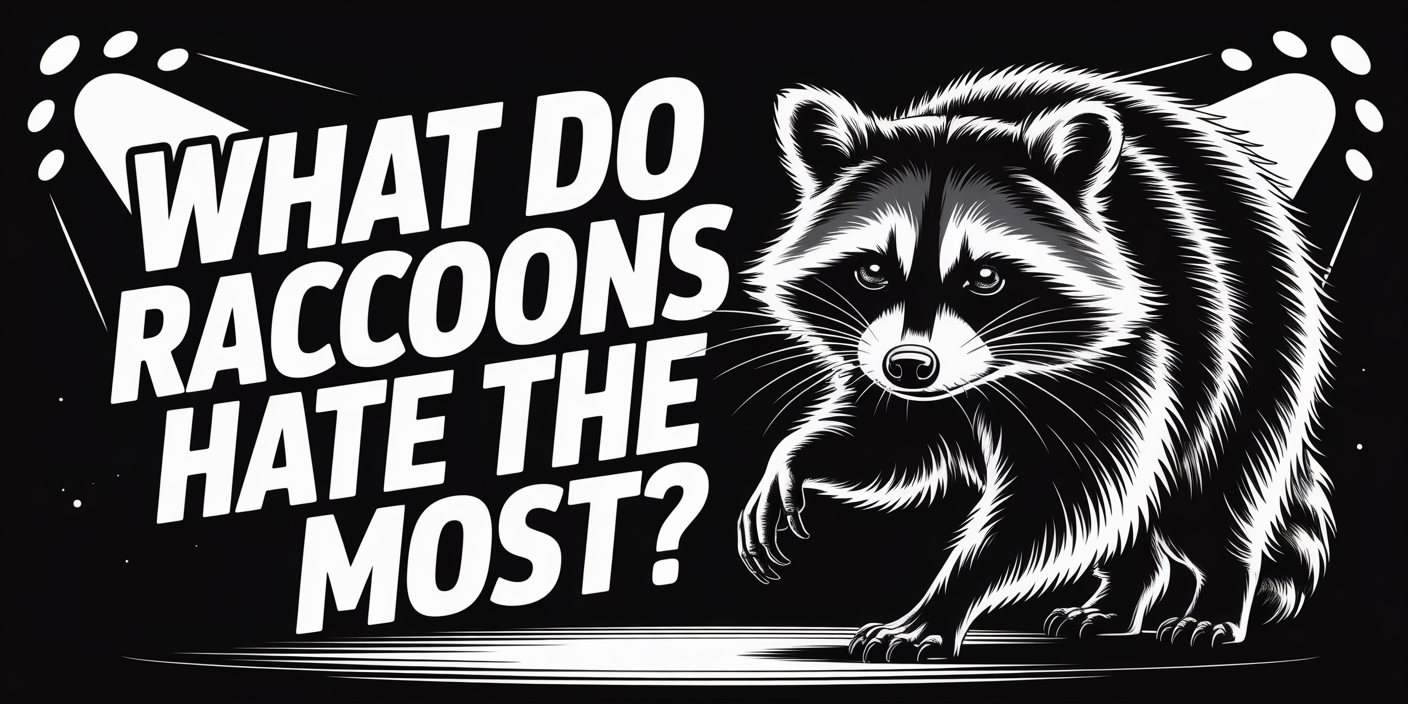“Raccoons avoid strong odors, loud noises, and anything that disrupts their comfort. Ammonia, garlic, cayenne, and peppermint irritate their noses, while motion lights and sudden sounds drive them away.”
If raccoons are turning your attic, garage, or backyard into their personal playground, you’re not alone. These clever creatures are known for their persistence, but the good news is, they’re also pretty easy to annoy. At AAAC Wildlife Removal of Treasure Coast, we specialize in wildlife control and have seen firsthand how effective the right deterrents can be.
By understanding what raccoons hate most, you can send a loud and clear message: this place is off-limits. From foul smells to flashing lights, there are certain natural raccoon deterrents that actually work, especially when you’re targeting common attractants like garbage cans. Raccoons aren’t just random visitors, they’re opportunists.
They’re looking for shelter, food, and a quiet place to raise their young, so anything that disrupts that comfort makes your home way less attractive. That’s where using scents, sensory irritants, and smart pest control strategies come in. Whether you’re dealing with a full-blown infestation or simply want to avoid one, AAAC Wildlife Removal of Treasure Coast offers safe raccoon removal and long-term prevention solutions. Let’s walk through the top smells, sounds, and deterrents raccoons can’t stand, and how you can use them to reclaim your space.
Learn more: What is a raccoon’s biggest enemy?
What Do Raccoons Hate Most? Top Smells, Sounds, and Deterrents They Can’t Stand
Ammonia and Vinegar
When it comes to scent that raccoons hate, ammonia ranks at the top. Its strong smell mimics the odor of predator urine, which taps into a raccoon’s natural fear and triggers their instinct to flee. With a powerful sense of smell, raccoons are especially sensitive to this kind of irritant.
Soaking old rags in ammonia and placing them near entry points, trash bins, or suspected den sites can instantly make the area feel unsafe. Just use caution, ammonia is a harsh raccoon deterrent and should never be used indoors or where pets and children might come into contact with it. Vinegar offers a slightly gentler, yet still effective, way to repel raccoons.
While not as intense as ammonia, the acidic scent of white vinegar still overwhelms a raccoon’s olfactory system and discourages them from staying near a food source or nesting area. Try filling small containers with vinegar or spraying it in high-traffic raccoon zones like decks, crawlspaces, or trash areas.
This method works best when reapplied every few days, especially after rain, to maintain the potency of the smell. When combined with other tactics, these simple household products can be a strong first line of defense against unwanted raccoon visitors.
Cayenne Pepper and Hot Spices
Raccoons might be tough, but their noses are incredibly sensitive, and spicy seasonings are a total nightmare for them. Cayenne pepper, chili powder, crushed red pepper, peppermint oil, garlic juice, onion and pepper, and other hot spices create a strong, pungent odor and an intense burning sensation when they come into contact with a raccoon’s nose or paws.
These ingredients irritate their senses and make the area feel unsafe. Sprinkling them around garden beds, trash bins, entry points, or anywhere you’ve seen raccoon activity can help deter raccoons from your property. Some homeowners also create homemade sprays using cayenne, hot pepper, water, and dish soap for added reach on fences or porch steps.
Consistency is key. Rain, wind, or time will weaken the smell, so it’s important to reapply often. To keep raccoons away from your home, consider pairing hot spices with strong-smelling solutions like peppermint, garlic juice, or even essential oil blends designed for wildlife deterrence. Some people also use Epsom salt sprinkled around high-traffic areas for an added scent barrier raccoons don’t enjoy.
While natural and relatively safe, spicy deterrents should be kept away from pets. At AAAC Wildlife Removal of Treasure Coast, we recommend these methods as an early step in making your property less inviting, especially because raccoons hate the smell and will often look elsewhere for shelter.
Motion-Activated Lights or Sprinklers
Raccoons are nocturnal by nature, which means they thrive in dark, quiet spaces where they can move undisturbed. That’s why motion-activated lights are such a great deterrent. A sudden burst of bright light can startle them and disrupt their nighttime foraging or nesting habits. Placing these lights near trash cans, garages, attics, or entry holes can make your property feel exposed and unsafe for them.
The best part? Once installed, these devices do the work for you, no need to reapply or reset every day. Motion-activated sprinklers take it a step further by adding a burst of water into the mix. It’s harmless, but highly annoying to raccoons. The surprise element makes them associate your yard or home with discomfort, encouraging them to move on quickly.
These sprinklers work especially well for gardens, lawns, and around decks or crawl spaces. At AAAC Wildlife Removal of Treasure Coast, we often pair these tools with physical exclusion techniques to boost long-term effectiveness. Raccoons are smart, but they’re not fans of unpredictable environments, and that’s exactly what these tools create.
Loud or Sudden Noises
Raccoons rely heavily on their sense of hearing to stay alert and avoid predators. That’s why loud or sudden noises can be a major deterrent. Radios playing talk shows, ultrasonic sound devices, or even banging pots near entry points can disrupt their sense of safety.
These critters don’t want to build a den where they’re constantly on edge, so keeping things noisy can drive them away. This method works especially well at night when raccoons are most active and expecting quiet surroundings. To make this tactic work long-term, it’s best to rotate the sounds or change the location of the noise source.
Raccoons are smart and can get used to repetitive patterns if they’re not varied. Even something as simple as leaving a portable speaker near your attic or deck and playing talk radio at night can make the area feel too “human” for them. At AAAC Wildlife Removal of Treasure Coast, we’ve used this trick successfully in combo with sealing entry holes and scent deterrents. The key is to make your space feel unpredictable and unsafe, two things raccoons hate.
Predator Scents (Real or Fake)
Raccoons are instinctively cautious and tend to avoid areas where they sense a threat. That’s why predator scents, whether real or simulated, are highly effective at keeping them away. These smells tap into their natural fear responses and create an environment that feels unsafe for nesting or scavenging.
At AAAC Wildlife Removal of Treasure Coast, we often recommend using these as part of a comprehensive prevention plan. You can purchase predator urine in liquid or granular form from garden centers or online, then apply it around garden edges, fences, or known raccoon pathways.
Even household pets can help, leaving out dog fur or letting your dog patrol the area sends a message that predators are nearby. For best results, combine scent deterrents with light, noise, and exclusion methods.
Common Predator Scents Raccoons Hate:
- Coyotes – Their scent, especially urine, is a strong natural deterrent.
- Foxes – Fox urine signals danger and is commonly used in repellent products.
- Bobcats – Known to hunt raccoons in rural areas.
- Wolves – Though rare locally, their scent is still effective and available commercially.
- Owls (Great Horned Owls) – Prey on raccoons, especially the young.
- Dogs (Large Breeds) – Their presence and scent can make raccoons think twice.
- Humans – Raccoons often avoid areas with regular human activity and scent.
- Mountain Lions or Cougars – A threat in remote or forested regions.
Pro Tip: Products with coyote or fox urine are easy to find and reliable. Reapply after rain and focus on known access points to keep raccoons from returning.
Ready to Make Your Home Raccoon-Free?
If raccoons are making themselves at home on your property, it’s time to take action. From loud thumps in the attic to tipped-over trash cans or torn-up gardens, the signs are clear, and ignoring them can lead to costly damage and serious health risks. At AAAC Wildlife Removal of Treasure Coast, we don’t just remove raccoons, we help you get rid of raccoons for good.
Our team uses proven, humane techniques and the best raccoon repellent methods available to protect your home and everything around your property. We offer thorough inspections, expert exclusion work, and custom solutions that match your home’s layout and specific risk points.
Whether you’re dealing with an active infestation or trying to stop one before it starts, we’re the control company you can trust to do it right. Call us today for a free assessment and let’s create a raccoon-free zone that feels safe, secure, and stress-free. Your attic (and your sleep) will thank you.




